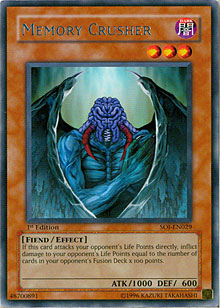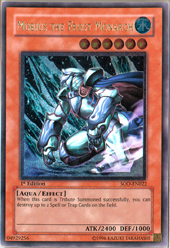This week, as promised, is the last installment in the "Common Mental Traps and How to Avoid Them" series. In the last two articles, I’ve explained a bit about different psychological factors that can influence the way we think, act, and feel. Knowledge of these factors will arm you with weapons against your own mistakes. The importance of recognizing what can trigger critical errors in your judgment can help you avoid common errors and recover from them much faster. I think the great Nobel laureate, Richard Feynman, said it best: "The first principle is that you must not fool yourself, and you’re the easiest person to fool."
Memory Limitations
Our memory is selective. We tend to remember certain things and distort or forget others. We only remember fragments of our real past experiences. Why? Because those fragments are influenced by our history, beliefs, mood, and what we have learned. During the course of a match, this could mean the  difference between a power play and a devastating mistake. The graveyard, the removed-from-play pile, and the field are what are commonly referred to as public information. It’s your job to pay close attention to what is present in these three areas. However, we all know that it’s difficult to remember what the opponent has used as the game rolls on.
difference between a power play and a devastating mistake. The graveyard, the removed-from-play pile, and the field are what are commonly referred to as public information. It’s your job to pay close attention to what is present in these three areas. However, we all know that it’s difficult to remember what the opponent has used as the game rolls on.
Some of us need to concentrate more on our strategic plays than on memorizing the opponent’s graveyard or keeping an accurate record of the opponent’s actions. That’s why I love the recent implementation of the note-taking rule. Nothing has been more of a blessing to the dueling world than this, at least in my opinion.
To make this point a bit clearer, here’s a short overview of the seven "sins" of memory proposed by Psychology Professor Daniel Schacter in The Seven Sins of Memory.
-Our memory weakens and we lose our memory over time.
-We are preoccupied with distracting issues and don’t focus attention on what we need to remember.
-We search for information that we may be desperately trying to retrieve—something we know that we know—but are blocked.
-We assign memory to the wrong source.
-Memories are implanted as a result of leading questions, comments, or suggestions when we try to call up a past experience.
-Our present knowledge influences how we remember our pasts. We often edit or entirely rewrite our previous experience.
-We recall disturbing events that we would prefer to eliminate from our minds altogether: remembering what we cannot forget, even though we wish that we could.
It’s not hard to understand how each of these seven instances of an error in cognition may be applied to in-game events. The seventh "sin" is probably the most common for those who have had bad experiences during their matches that made them very upset. They often remember those incidents when a specific card comes into play or a certain game situation similar to the past appears. We may link our memory to that card or game situation ("sin" #4) instead of recognizing that it may not have been an error on our part. Numbers 2 and 3 can occur simultaneously.
This is common when we’re stuck in a sticky game situation that we can’t seem to think ourselves out of. We’re desperately searching for answers because time is short and we have few options. Suddenly, we may have a sudden revelation that puts us one step closer to the answer, but may become distracted by the commentary behind us. Sometimes even the quiet sound of laptop keys from your favorite Metagame.com reporter can break your concentration, am I right? (Just kidding, Jason!)
I like #6 because it’s so common. Experiments have shown that we definitely have the ability to rewrite our memories of past experiences. They can be changed, manipulated, and discarded altogether (as #5 states). Sometimes when we go on a winning streak we tend to forget about what really got us there in the first place. Omission of certain facts is not unheard of, especially when all your victories are based on your extraordinary skill and sense of timing right? There’s nothing like a good victory to distort the facts about what really happened. This is the easiest way to fool ourselves.
It’s simple: when we win, it’s because of our unparalleled genius. When we lose it’s because of our teammate’s deck build, we were tired that day, traffic was bad, etc. Finding out what actually contributes to your wins is the best policy. It might just have been good luck and not your good plays. That’s okay too. Just own up to it and make sure you repeat what works after you find out what it really is.
Excessive Plays
What do I mean by excessive plays? Well, I don’t mean making plays that require a large commitment of cards in one turn. What I mean is making plays just to make a move for the turn. I’ve done it, you’ve done it, and some of us still do it. Conservative play is based on the premise that you don’t use three cards to accomplish a task that one or two cards can accomplish just as well. However, it’s easy to misunderstand that concept. For example, let’s say that you and your opponent drew your starting hands. You have elected to go first and make your opening move. Let’s assume that you will make the common opening of one monster face down and one spell or trap face down. On the next turn, your opponent mirrors your play. Now it’s your turn. What do you do? You have a few choices and I find it better to narrow them down to the top three: 1) set a spell or trap and pass the turn, 2) set or summon a monster (if the former is the case then you will probably opt to attack), or 3) do nothing.
What you choose depends on a lot of factors, but most likely it’s linked to your individual playing habits and how you like to play the game. All three options can be good plays. How do you decide? The way I decide is by looking at the possible downsides to each action (assuming my opponent has what’s necessary to make my move a costly one). Option #1 will  most likely put you in a position where your opponent can play Heavy Storm or summon Mobius the Frost Monarch and ruin your day. If he or she is lucky enough to have Heavy Storm, then you will be down a card. This may not matter much given the current situation. A simple one-card lead won’t win the game by itself. However, don’t discount the possibility of a follow-up move after the Heavy Storm.
most likely put you in a position where your opponent can play Heavy Storm or summon Mobius the Frost Monarch and ruin your day. If he or she is lucky enough to have Heavy Storm, then you will be down a card. This may not matter much given the current situation. A simple one-card lead won’t win the game by itself. However, don’t discount the possibility of a follow-up move after the Heavy Storm.
Option #2 can be potentially dangerous. If your opponent is fortunate enough to have Torrential Tribute face down, then how will that affect your game position? Sure, you can bet on that Mirror Force face down to save your skin (assuming it’s there). But I think it’s more likely that you won’t have it. At this point, you have another pair of options. First, you can set another spell or trap as an obvious "tell" to your opponent—basically saying, "Hey, I just placed my Mirror Force on the field! Don’t try anything stupid!" Or, second, you may hold your ground and take the hit. After all, you have 8000 life points right? If you went with the first pick of the pair, then you may end up getting ransacked by your opponent’s Heavy Storm next turn. If that happens, you’ll be stuck with three cards in hand and an empty field. This may be the worst case scenario, but it’s important to take worst cases into consideration and how they will affect your chances of winning. If the worst case will set you back so far that you cannot recover well (and in this case it will), then what? The solution is simple: don’t make the move that will put you in that harmful situation unless it’s absolutely necessary.
Since Options #1 and #2 will increase your chances of running into undesirable circumstances, then the proper action would be Option #3: do nothing. It’s easy to trick yourself into thinking that you must make a move every turn. Why do all players do this at some point in their dueling careers? Some of it is caused by our tendency to imitate others in times of stress or confusion. The rest of it is our tendency to want to do something. Call it hyper-activity or boredom, but we tend to want to do something all the time. Doing nothing is very difficult, but sometimes it’s the best course of action. There’s no need to put yourself in a situation where your opponent’s good fortune may put you at severe disadvantage. In Yu-Gi-Oh!, sometimes our "bad luck" is just our opponent getting extremely lucky, but most of the time it can be attributed to making unnecessary plays just to make them.
—Bryan Camareno